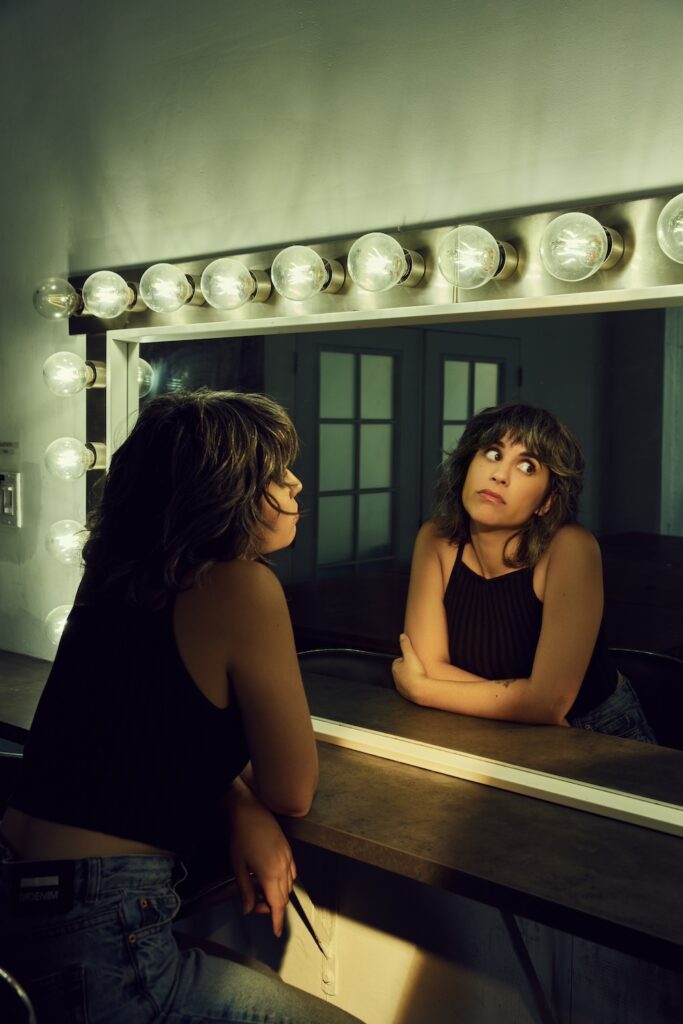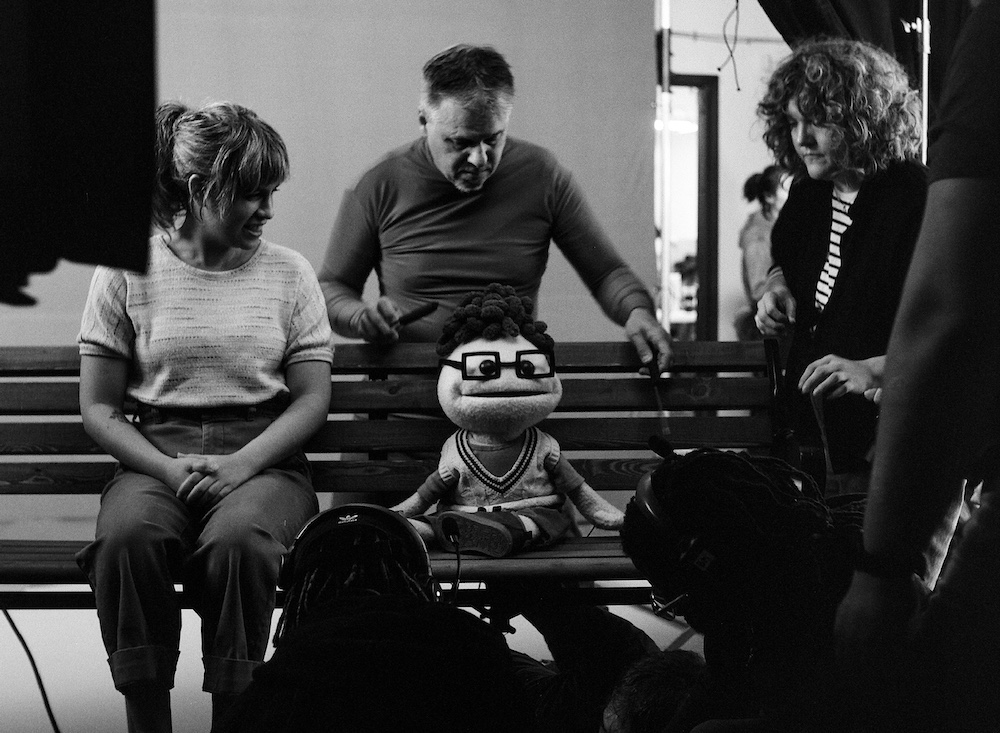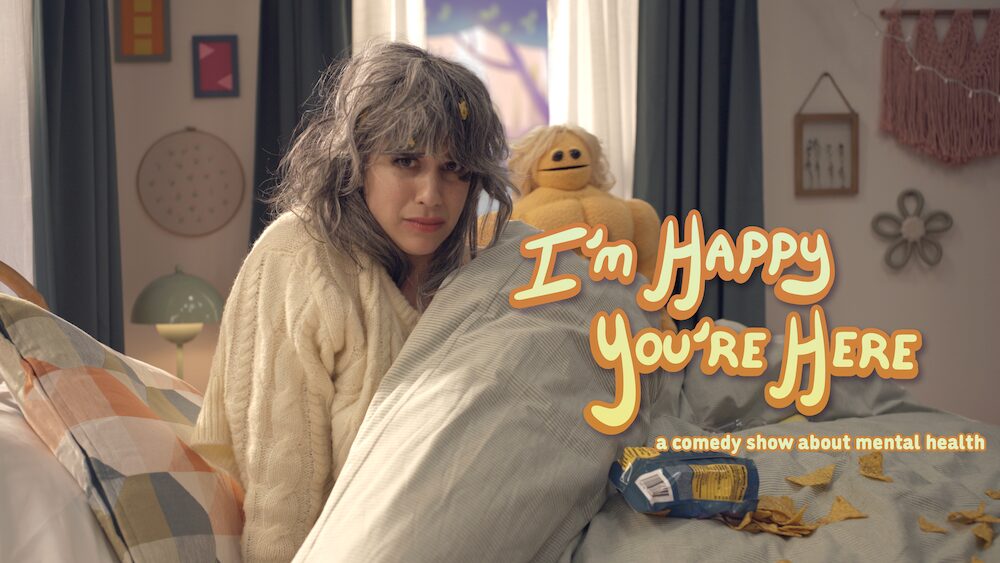Ashly Burch is known as a producer, writer, and series regular on Apple TV’s Mythic Quest and has since branched out to be the co-creator and co-showrunner of the spinoff Side Quest.
She was also seen in the feature film We’re All Gonna Die which debuted at SXSW in 2024. She won an Emmy for writing an episode of Cartoon Network’s Adventure Time and earned a BAFTA nom for her performance in the video game version of Horizon Zero Dawn. And in May, during Mental Health Awareness Month, Burch launched her new web series I’m Happy You’re Here.
Through a Mr. Rogers Neighborhood lens, the series is geared towards adults and features Burch and a cast of puppets as she unpacks various aspects of mental health and methods to navigate them.
“I’ve struggled with anxiety and OCD for much of my life, and before I understood those conditions, I felt incredibly lonely and isolated,” Burch told GLAAD in a recent interview. “As we get older, I think the impulse to hide and be silent about our struggles only increases, and that silence is supported culturally.”
Read the rest of our interview with Burch below.
You star in and are a writer for Mythic Quest and are the co-creator and co-showrunner of it’s spinoff, Side Quest. What is the difference between Ashly on your first day on Mythic Quest to Ashy today in 2025?
I have a lot more experience and a lot more confidence in my abilities. When I joined Mythic Quest, it was my first time working on-camera in a lot of respects, and I was pretty terrified. But I learned so much about basically every aspect of production, and now that I’ve directed and co-run my own show, I know that I’m so much more capable than I thought I was when I started.
Have you always been well-versed in what is traditionally viewed as “nerd culture”?
I recently saw a home movie of me from when I was about 4 years old — I was waddling around holding an NES control that wasn’t connected to anything. So games have been in my blood since I was a toddler, and other nerdy interests followed suit as I got older.

Why do you think there is a symbiotic relationship between nerd/gaming culture and the LGBTQ community?
Games are an opportunity space. I’ve spoken to many folks who experimented with gender by playing female characters in games or explored their sexuality by having same-sex romances in games like Mass Effect. As cis, white, male-dominated as games are purported to be, there are so many titles that give folks the opportunity to try on different identities.
My favorite example of this is Saints Row 4 — the character customization was so robust that you could create a totally bespoke gender identity for your character. I don’t think this is the only reason games are so popular in the LGBTQ community — games are fun, so we like playing them! But I do think they offer a unique opportunity for folks to either experiment with their identity or have their identity showcased and validated in a safe way.
You recently launched your mental health series, I’m Happy You’re Here in May during Mental Health Awareness Month. Where did the idea for this come from?
We have this perception that adults shouldn’t need help or should have figured everything out by now, but that’s just not true. So many people I know are getting bipolar disorder or ADHD diagnoses in their 30s and 40s. Or even if they’re not struggling with a mental health condition, they’re getting divorced, or they’re experiencing grief, and they don’t know what to do with the feelings they’re having.
As we age, our lives get more complicated — not less. Which means we need even more help. So that’s really the purpose of the show — to validate the experiences of those who struggle, to provide help, to remind people that they’re not alone — and also to help educate the loved ones of the folks who are going through a difficult time. I would love for someone struggling with anxiety to be able to send the show to a loved one and say: “This is how my brain works. This is what I’m going through.”

I’m Happy You’re Here premiered not long before the current presidential administration cut specialized suicide prevention service for LGBTQ youth. When this news was announced, how did your perspective on your new series change?
It’s — excuse my language — f*cking heartbreaking that this series only becomes more relevant the more damage that is done to our support systems and institutions. The news just galvanized me. We’re currently trying to secure funding to be able to make more of the show, and news like that just makes me more determined to find a way forward to create more episodes.
What kind of responses have you received from the series?
The response has been overwhelmingly, almost universally positive. People really understand what we’re trying to do and it’s so gratifying. I’ve seen multiple comments from folks saying the episode helped them feel seen or that they’re going to show it to a family member to help explain their anxiety.
Some of the responses that have moved me the most are from men in their 30s and 40s — specifically a few men in the military who said that the show brought them to tears. It’s honestly been one of the most incredible experiences of my career. I feel so grateful to our crew and creative team who made the show happen.

What are some things that surprised you while making the series?
How easily it came together, honestly. I tried pitching this idea around about five years ago and the main response I got was that people couldn’t “see it” that it was “too off the wall”. So going into creating it myself, I was a little worried that maybe it wouldn’t come together… but it absolutely did.
8. Why do you think it is important for queer filmmakers and creators to tell stories — queer and otherwise?
Queer stories are human stories. Representation is important for people who identify with queer identities to feel seen because we deserve that experience but it’s also important for all people to see how expansive the human experience is. When queer people create art and are unabashedly themselves I really do think we showcase the possibilities available in all people’s lives.
If you could give advice to 18-year-old Ashly, what would it be?
Go easier on yourself. You’re stronger than you think, more resilient than you think, and more capable than you think.













